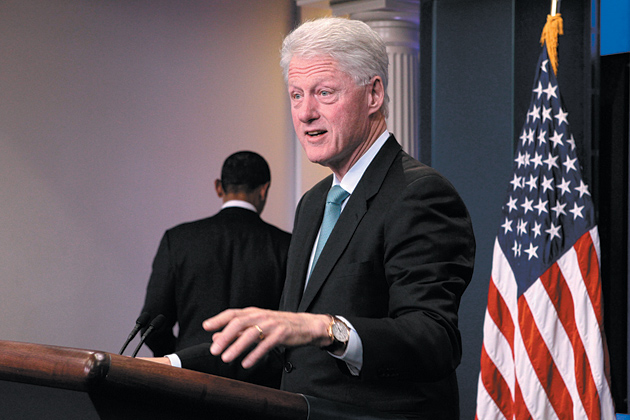1.
President Obama, a master of understatement, did it again when he described the Democratic midterm losses as a “shellacking.” No, it was a massacre. The party lost support from virtually every demographic group. Even Michigan auto workers whose jobs were saved by the bailout of GM voted Republican. While Democrats got some comic relief from Christine O’Donnell in Delaware and Carl Paladino in New York, in reality it is hard to see how things could have been much worse.
Jonathan Martin at Politico has observed that the impressive expansion of the electoral map that Democrats enjoyed in 2008 has evaporated. Conservative-leaning states won by Obama in 2008—Virginia, North Carolina, and Indiana—swung back to the Republican column. Critical swing states that Obama won in 2008—Ohio, Pennsylvania, and Florida—abandoned the Democrats. What’s left is an electoral map that looks a lot like the 2004 presidential election between George Bush and John Kerry, characterized by district-by-district trench warfare. As Paul Begala succinctly noted, “If Obama holds the Kerry states and carries only the states in which Democrats prevailed in 2010, he loses.” In the present environment, even holding onto the Kerry states of Michigan, Pennsylvania, and New Jersey looks challenging.
Was this disaster caused by reactions to the awful economy—an economy that Obama believes he saved, but not sufficiently to please voters? Or was it, as the Republicans believe, a repudiation of Obama and all that he and Nancy Pelosi stand for?
There’s a lot of evidence to support the idea that the results were mainly attributable to the economy. Well before the actual midterm vote, the political scientist Douglas Hibbs, the father of quantitative election analysis, predicted a huge loss for Democrats on the basis of nothing but the economy’s poor performance and the fact that the Democrats, having picked up so many seats in the previous election, were electorally overextended. In 2008, voters who were concerned about the economy clearly broke for Obama. Now, according to a CBS poll, 65 percent of voters believe that the Obama stimulus package has hurt the economy.
But even if it was the economy, there’s no guarantee that 2012 will be any better. The economy may not improve—in part because the new Republican House majority will oppose any policy that might make things better. And the Obama administration has consistently made the worst politically of a bad economy, overpromising, underdelivering, and seemingly going out of its way to alienate those who should be its supporters.
If Democrats are to have any hope of turning things around, this has to change, fast.
2.
Despite what optimists within the White House may believe, the odds are not good for a repeat of 1996, when Bill Clinton made a startling political comeback after suffering a drubbing in the previous midterm elections. Clinton, after all, presided over a booming economy: in the two years prior to the 1996 election, the US economy added more than 5 million jobs, and by November 1996 the unemployment rate was only 5.4 percent. In contrast, Obama presides over an economy that has suffered a severe financial crisis—and recovery from a severe financial crisis is almost always slow and painful, with very high unemployment persisting for years. Professional forecasters surveyed by the Philadelphia Federal Reserve now predict an average unemployment rate of 8.7 percent in 2012, awful news for a president seeking reelection.
A tough, skillful political team might be able to win even in the face of such economic weakness. But the Obama team has demonstrated neither toughness nor skill. The trouble was apparent right from the beginning. After the 2008 election, Obama had the political winds at his back. Yet rather than bargaining from a position of strength and demanding an economic program adequate to the scale of the economy’s problems, Obama made his goal the working out of a cooperative political process—accommodation and the fantasy of bipartisanship.
And despite warnings from many economists (ourselves included) that the stimulus package that resulted was much too small, Obama engaged in premature triumphalism. In February 2009, he said of the plan:
It is the right size, it is the right scope. Broadly speaking it has the right priorities to create jobs that will jump-start our economy and transform it for the twenty-first century.
The only thing missing was a “Mission Accomplished” banner.
Worse, the administration seemed unable to change its line once it became clear that the program was, in fact, inadequate. Progressives kept waiting for the moment when Obama would say something like “My predecessor left the economy in even worse shape than we realized—it’s time for further action.” That moment never came. Instead, officials kept insisting that the recovery was on track, long after it was obvious to everyone else that it wasn’t.
Advertisement
After the midterms, leading Democratic strategists blasted the administration for being tone-deaf: “A metaphor about a car in the ditch when people are in trouble and angry about the abuse of Wall Street, it’s just out of touch with what’s going on,” declared the pollster Stan Greenberg, while James Carville asked, “What were they thinking?” A better political strategy, said Carville, could have limited Democratic losses in the House to thirty seats, but the administration remained weirdly passive right through to election day.
The same passivity was visible on other fronts: the administration did nothing as its mortgage modification program degenerated into a subject of derision; it did nothing to address public anger over Wall Street bailouts; it dithered in the face of Chinese currency manipulation; it hesitated and prevaricated for weeks after the Gulf oil spill. The administration’s political strategy seemed to boil down to sitting around and waiting for the economy to improve.
Now the Republicans control the House and have effective blocking power in the Senate. And all indications are that they are ready and willing to use this position to deny the Obama administration any achievements it could point to in 2012. Even national security is no concern: Senate Republicans have blocked a badly needed strategic arms treaty on obviously spurious grounds. And the economy is clearly fair game: neither the plight of the unemployed nor the likely economic consequences of a sudden drop in purchasing power deterred Republicans from blocking an extension of unemployment benefits.
Most telling of all is the recent furious, coordinated assault on Ben Bernanke and the Federal Reserve. Until that assault began, the possibility of “quantitative easing” (purchasing bonds in an attempt to reduce long-term interest rates) by the Fed had been widely viewed as the conservative alternative to fiscal stimulus. The Fed would take action to reduce interest rates and thereby promote private spending. As many have pointed out, the Fed’s current approach is very much in line with the policy prescriptions of Milton Friedman, the patron saint of conservative economics. Indeed, in 1998, when Japan was suffering economic difficulties very similar to those we face now, Friedman urged the Bank of Japan to adopt what amounted to a policy of quantitative easing.
But when the Fed finally announced a modest program of quantitative easing on November 3, it was rocked back by outraged demands from Republicans—in the company of China and Germany, two countries that through their own economic policies are thwarting the global economic recovery in the Eurozone and the US—to immediately cease and desist. Moreover, key Republicans in both the Senate and the House demanded that the Fed abandon any effort to promote employment and limit its mandate to price stability.
The budget expert Stan Collender, with a sharp sense of realpolitik, anticipated the Republican “scorched economy” strategy back in August: “Ben Bernanke may have painted a big bullseye on the Federal Reserve,” he wrote on his blog Capital Gains and Games. He went on to say:
The same political pressure that has brought fiscal policy to a standstill in Washington is very likely to be applied to the Fed if it decides to move forward. With Republican policymakers seeing economic hardship as the path to election glory this November, there is every reason to expect that the GOP will be equally as opposed to any actions taken by the Federal Reserve that would make the economy better, and that Republicans will openly and virulently criticize the Fed for even thinking about it. The criticism is likely to come both before any action is taken to try to stop it from happening and afterwards to make the Fed think twice about doing more.
This will come in spite of the fact that, unlike fiscal policy changes, the actions the Fed is considering will not increase the budget deficit. The deficit has never really been the real issue; it has always been subterfuge and an easy and convenient way to build opposition to the White House’s efforts to deal with the economy.
Thus the Democrats must begin by facing up to the reality of an uphill struggle. The historic opportunity of 2008 has been squandered. While Democrats held the Senate this year, they will be in severe jeopardy in 2012, when a disproportionate number of Democratic senators will be up for reelection. And as we’ve just seen, they can’t count on the economy to propel Obama to reelection—in part because Republicans, whatever they claim or actually believe, will do all they can to keep the economy depressed.
Nor can they count on Obama himself to lead a comeback. In a dispiriting 60 Minutes interview given after the midterms, he actually seemed to accept Republican smears—blaming himself, not the GOP, for the failure to “maintain the kind of tone that says we can disagree without being disagreeable.” And it’s truly astonishing that as corporate profits hit new records despite mass unemployment, Obama apparently takes seriously accusations that his administration is antibusiness.
Advertisement
Even if Obama were suddenly to find an inner FDR, would anyone notice? His aloofness has become so indelibly registered in voters’ minds that if he tried to change style—even if he wanted to, a big “if”—this would immediately come across as opportunistic. Having trusted and been disappointed by Obama once before, they are very unlikely to give him another chance.
3.
What Progressives Can Do
So, should progressives just give up? History says no—over the past decade American politics have proved astonishingly mutable, with not one but two supposedly permanent majorities quickly collapsing in 2006 and 2010. Things may turn again, as long as progressives fight on. But what would fighting on look like?
First, it would mean fighting on economic issues. While it is extremely unlikely that Democrats can undertake any further fiscal stimulus, they can put Republicans on the spot, resisting calls for austerity and making the case, repeatedly, that the GOP is standing in the way of necessary action. The fight over renewal of unemployment benefits should be only the start. Democrats can also denounce Republican attacks on the Federal Reserve and defend the Fed’s independence. They can resist attempts to turn back health care reform, on both humanitarian and long-term budgeting grounds, as health care reform is the critical factor in reining in the long-term budget deficit.
And there are steps that the White House could take without congressional approval. Democrats could pressure the administration to fix the inexcusable mess at the HAMP (mortgage modification) program—a program whose Kafkaesque complexity has in many cases made matters so bad for home owners that it has triggered the foreclosures it was supposed to avoid. In addition, mortgage relief would benefit the wider economy. Furthermore, the scope of mortgage relief could be made much wider if Fannie Mae and Freddie Mac were used to guarantee mortgage refinancing. Other proposals go even further: for example, that Fannie and Freddie engineer reductions in mortgage principals. All of this could be done, conceivably, by executive order.
Democrats could also demand that the administration—specifically, the Treasury—act on the problem of China’s currency manipulation, which keeps the remnimbi artificially cheap compared to the dollar. While China’s actions are not the main factor in our economic woes, they are a factor. China’s unprecedented level of currency manipulation siphons off demand for US products that is much needed in our depressed economy, and shifts our imports away from other countries such as Mexico that are much more likely to reciprocate with purchases of American goods. The obvious American response is to threaten, and if necessary actually impose, countervailing duties on Chinese exports—a step that is backed even by strong advocates of free trade, such as Fred Bergsten of the Peterson Institute for International Economics. Such a move would have overwhelming Democratic support in Congress, and would put Republicans on the spot if they tried to block it.
While seeking to limit damage on the economy, Democrats can also force the Republican agenda into the open. On issue after issue, the public favors what is in fact the Democratic position over what is in fact the Republican position—but Democrats gain little from this preference, because voters don’t know what either party actually stands for. Merely to cite Republican opposition votes as an obstacle to change is to ignore what might be done to inform and mobilize the public.
Obama’s failed efforts at bipartisanship are partly to blame. Consider the remarkable message of a poll on Social Security taken just before and on the night of the midterm elections.1 This poll found overwhelming support for what amounts to the Democratic position on Social Security: maintain benefits, don’t raise the retirement age, but do raise taxes on higher earners if necessary. Yet the same poll found Republicans more trusted than Democrats to do the right thing. How is this possible? Surely Obama’s support for a supposedly bipartisan deficit commission—even after the commission’s cochairmen came out for cutting benefits and raising the retirement age—must have had an effect on the outcome. Voters apparently suspect that Democrats will sell them out on Social Security; and it’s up to Democrats to get out the message that they’re wrong.
There are other issues on which Democrats can try to draw the line. They inexplicably failed to make a midterm election issue of Republican demands that upper-income tax cuts be extended even in the face of large budget deficits; and Obama has now settled for a two-year extension of all the cuts, in return for some additional stimulus. It’s a questionable deal, but in any case the tax-cut issue will return—and the real lesson of the debacle so far is that Democrats need to make the case for not perpetuating tax cuts for the wealthy early and often. In fact, this is one issue where Democrats have to regain some credibility, if they want to reenergize a defeated and demoralized base.
And this brings us to our last point. Democrats need to make it clear that if Obama isn’t going to be the leader of the Democratic agenda—and all indications are that he can’t or won’t—they will advance that agenda anyway, with or without his help. They have to be ready to delink their political fate from Obama, and make it clear that they won’t tolerate further undermining of their goals by deluded calls for bipartisanship. Progressive groups—MoveOn, for example—helped put Obama in office by mobilizing their members and followers through a variety of organizational strategies, including use of the Internet. They did so only to be ignored and dismissed once the 2008 election was won, and now they need to be revived.
How far should delinking from Obama go? There is no obvious contender to mount a primary challenge, which is in itself a testimony to Democratic weakness. But the possibility is clearly there, and both will and should become a reality if Obama follows a path of capitulation.
In 2008, progressives fell for the fantasy of hope and change on the cheap; they believed Obama’s promise that the reforms America needed could float through on a tide of bipartisan reconciliation. It was not to be, and clinging to that illusion will only lead to more defeats. If progressives want to rebound, they’ll have to fight.
—December 16, 2010
This Issue
January 13, 2011
-
*
Conducted by Lake Research Partners, October 31–November 2, 2010, and available at StrengthenSocialSecurity.org. ↩





